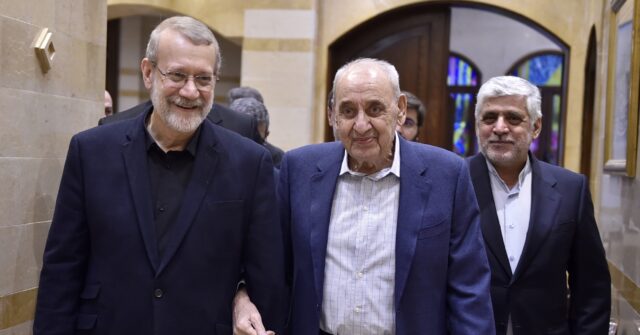The recent developments in the Israel-Hezbollah conflict reveal significant shifts in regional dynamics, particularly involving the Iranian regime and Lebanon’s government. Following a prolonged escalation of hostilities that erupted in October 2023, Iran has granted Lebanon’s government the green light to negotiate a ceasefire with Israel on behalf of Hezbollah, the militant group closely aligned with Tehran. Reports indicate that Iran is adopting a more supportive stance in light of the current situation, emphasizing that they are not aiming to thwart progress but are in favor of seeking solutions to ongoing issues. This comes from Ali Larijani, a senior adviser to Iran’s Supreme Leader Ali Khamenei, who conveyed this message after engaging with key Lebanese political figures like caretaker Prime Minister Najib Mikati and Parliament Speaker Nabih Berri.
The backdrop to this ceasefire initiative is the ongoing bombardment of Hezbollah-controlled areas in the Lebanese capital by Israeli forces. Throughout these clashes, Hezbollah suffered significant setbacks, losing much of its operational capacity and facing extensive destruction of its infrastructure, including command structures, weapon caches, and tunnel networks along the Israel-Lebanon border. This heavy toll has arguably shifted the group’s position regarding continued hostilities, making a ceasefire more palatable amidst the growing toll on its resources and the Lebanese populace. The suggestion of a ceasefire has been met positively by Israel, which seeks to stabilize the situation after achieving a military advantage, signaling a potential common ground that may lead to a break in hostilities.
Simultaneously, the United States has taken a proactive role in the ceasefire discussions, presenting a proposal to Lebanon that was subsequently relayed to Hezbollah. This involvement reflects a broader interest in de-escalating tensions in the region, especially as the humanitarian impact of the conflict weighs heavily on the local population. Observers note that a ceasefire would not only be beneficial for Lebanon but also align with international efforts to stabilize the region. Under the considerations of President-elect Donald Trump, who has expressed intentions of advocating for peace in Lebanon, there appears to be a concerted push from multiple fronts to halt the ongoing violence.
This diplomatic maneuvering showcases how various state and non-state actors are recalibrating their strategies in response to the evolving landscape of the conflict. Iran’s backing of Lebanon’s sovereignty in this discussion signifies its attempt to retain influence while navigating the complex realities of military losses faced by its ally, Hezbollah. This decision seems to reflect a recognition of the need for dialogue and potential resolution after months of intense military engagement. In this scenario, the Iranian regime appears to be balancing its interests in bolstering Hezbollah’s standing while being open to a ceasefire that could prevent further losses and instability.
Moreover, the potential for a ceasefire is critical not only for Lebanon but also for regional security dynamics, as prolonged conflict could have spillover effects that destabilize neighboring countries. The consideration of a ceasefire also brings into focus the broader geopolitical implications involving other regional powers, including the United States and Israel, both of whom aim to contain Iranian influence in the region. As Lebanon’s government engages with these various stakeholders, it must navigate the pressures from both domestic actors and international players concerned about the implications of Hezbollah’s actions.
Ultimately, the path to a ceasefire in the Israel-Hezbollah conflict is fraught with complexity, requiring careful negotiations that address the underlying security concerns of all parties involved. While there seems to be an emerging willingness to find a resolution, the actual implementation of such measures will require sustained diplomatic efforts and a commitment from all sides to prioritize peace over continued aggression. As the situation evolves, the international community will likely be watching closely to see how these dynamics play out and whether a lasting ceasefire can be achieved amidst the competing interests at play.

